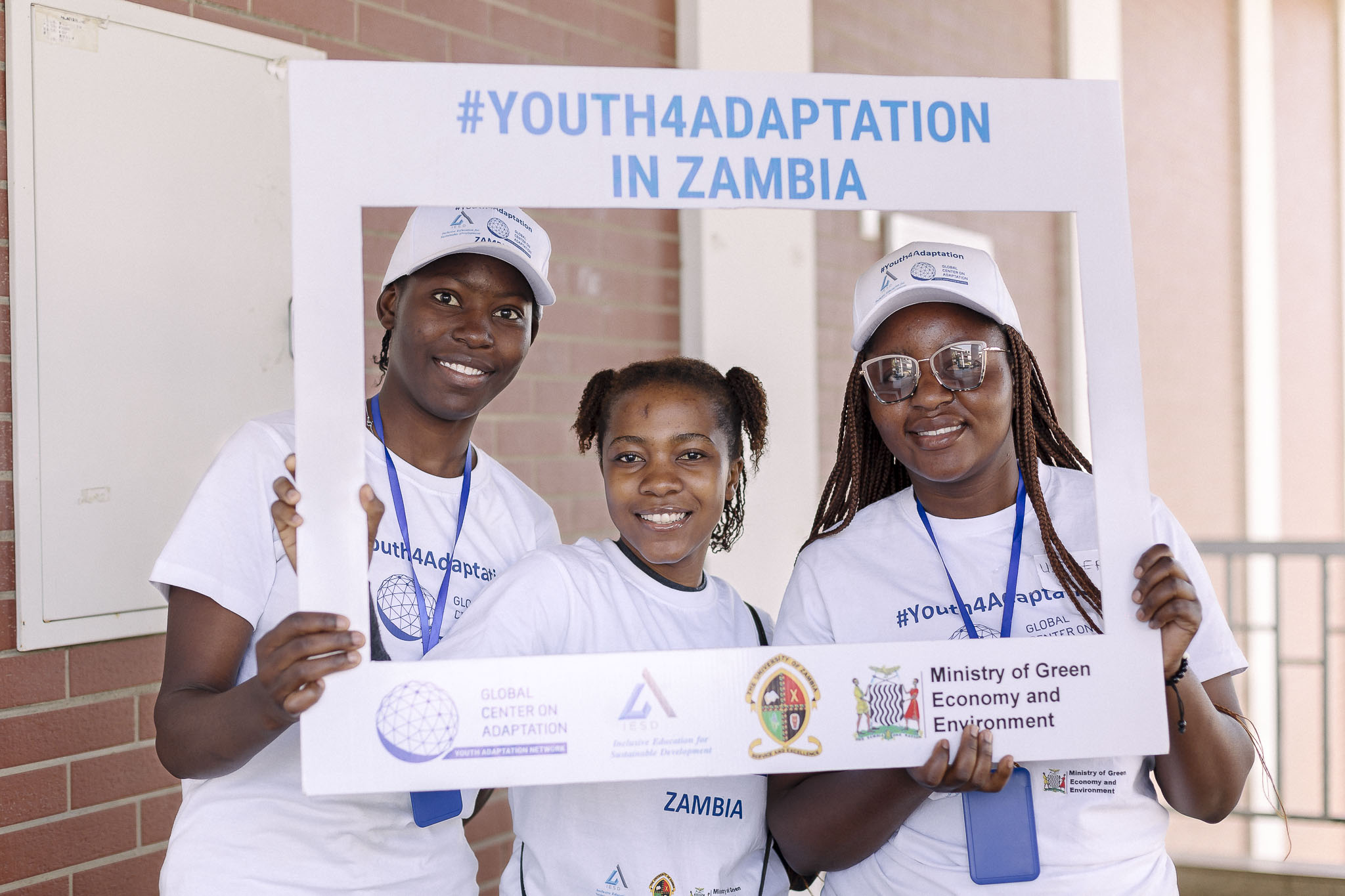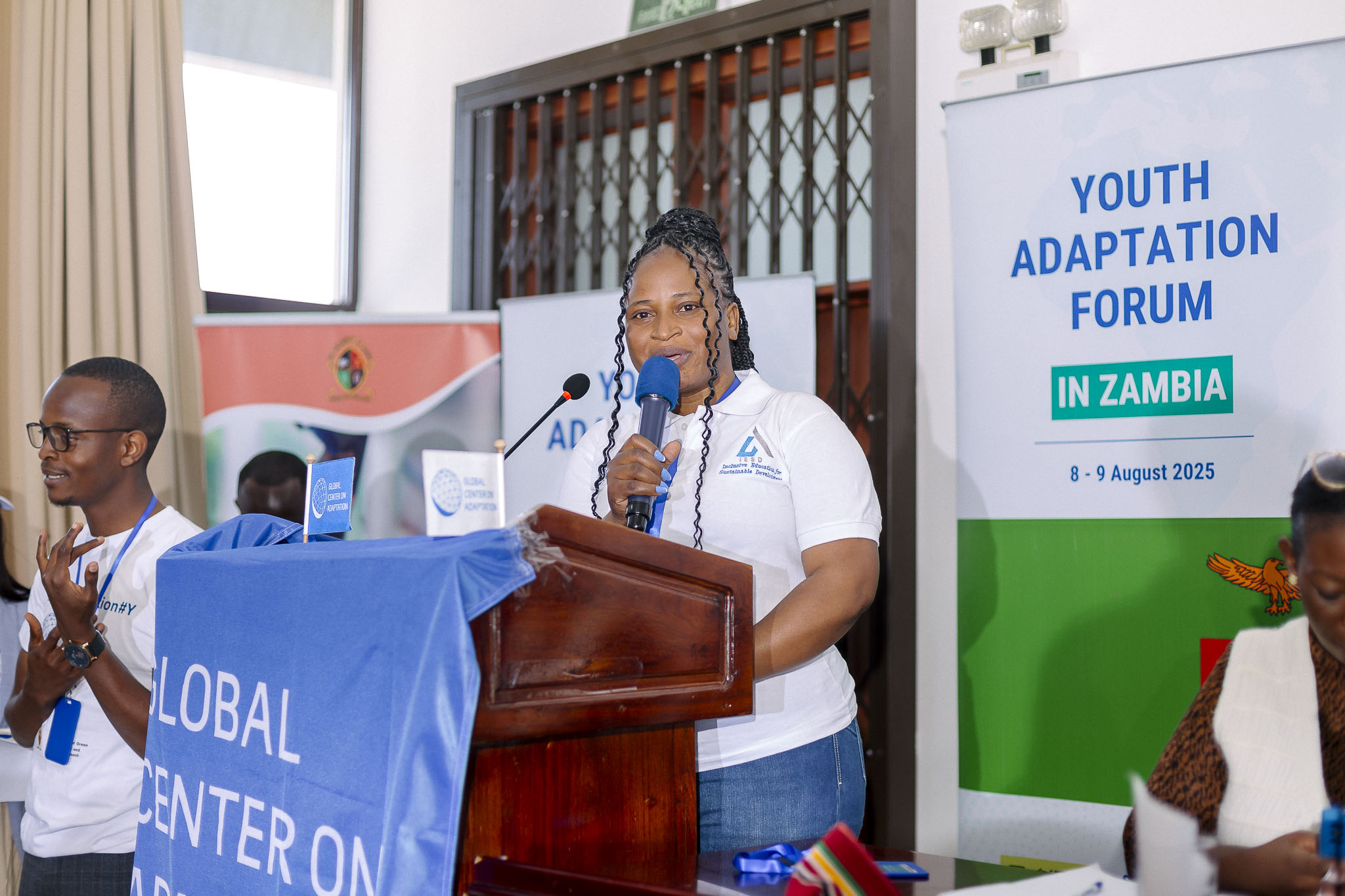Driving Resilient Leadership: Zambia’s Youth and the Central Role of Inclusive Education in Climate Adaptation
In the lead up to the NAP-Expo 2025 in Lusaka, the Global Center on Adaptation (GCA) convened the Fourth African Youth Adaptation Forum, uniting youth from across the country to spotlight Pan-African youth-led adaptation solutions.
The Fourth Youth Adaptation Forum, held in Zambia on the 8th and 9th of August, brought together over 280 students, youth-led organizations, universities and government representatives from across the country, as well as representatives from across Africa to engage in a formal exchange between young people and decision-makers. The Forum was one of eight youth forums organized this year by GCA in partnership with local organizations, reflecting the determination of Africa’s youth to shape a climate-resilient future.
Zambia, one of the youngest populations in the world by median age, underscores the mission for the Youth Adaptation Forums. Its current population of roughly 21 million people is estimated to double within the next 25 years, despite facing escalating climate threats ranging from extended droughts and flash floods to unstable growing seasons. In such a context, youth-led adaptation is born from necessity for survival and prosperity.
The Forum, organized by the GCA in partnership with Inclusive Education for Sustainable Development (IESD Zambia), spotlighted how young Zambians are driving local adaptation efforts and influencing national decision-making on climate resilience. The Forum also created a unique opportunity for youth to engage with local policymakers and peers from across the continent. During the Forum, participants exchanged perspectives with representatives from other countries and engaged in dialogue with the Minister of Green Economy and Environment of Zambia. These conversations opened space for young voices to influence decision-making, strengthen regional cooperation and knowledge sharing, and position youth as key actors in advancing Africa’s climate adaptation agenda.
During the Forum, participants worked together to draft the Zambia Youth Adaptation Forum Communiqué. The statement brings to the forefront the diverse challenges faced by the youth in Zambia, ranging from environmental degradation to compounding inequalities, and outlines a vision to lead the country into a more resilient future. The participants utilized the opportunity to call for collective action to strengthen national adaptation policies, expand and fulfill adaptation finance commitments, strengthen youth-led adaptation initiatives in the region, and scale up adaptation education, job creation, and intergenerational partnerships. The Communiqué was highlighted by GCA during engagements with government representatives and other officials attending the Africa Adaptation Acceleration Program Partnership Forum held at the National Adaptation Plan (NAP) Expo. Read the full communiqué here:
To pull together youth from all corners of the country, GCA partnered with IESD Zambia as the mobilizers of youth, underscoring the mission to secure a climate resilient future crafted by inclusive dialogue and comprehensive knowledge exchange. Ruth Nawakwi and John Lijimu of IESD Zambia have been leading the work on inclusive education and sustainable development since 2017 and shared with the Forum their experience conducting community needs assessments, mobilizing companies through corporate social responsibility programs and engaging with government and NGO representatives to support inclusive sustainable development.
With its origins in grassroots research and community capacity building, IESD Zambia’s mission is to strengthen national resilience by promoting an inclusive approach to education and sustainable development. At its core is a commitment to ensuring that young people, women and persons with disabilities are not left behind in national development policies, community programs and climate adaptation efforts. IESD’s Founder and Executive Director, Ruth emphasized the organization’s founding commitments, “We aim to ensure that no one is left behind when it comes to national resources and community well-being. We want to fight against exclusion, speak on behalf of marginalized groups, and complement the efforts of government and other organizations working for the welfare of all.”

As IESD has grown over the years, so has its reach. Their mission-driven work is exemplified by one of their flagship projects called ‘Future Leaders’ which demonstrates the role that organizations such as IESD play in local capacity development for communities on the path to resilience. The project focuses on building the capacity of young people by training them in governance, development, and environmental sustainability, so they can become the community leaders of the future. “We don’t just want to advocate; we want to sit at the table with decision-makers,” remarked John.
IESD’s efforts to drive climate adaptation are tightly linked to education. Their research with the UN World Food Programme revealed how droughts, floods, and hunger push children, especially those from food-insecure households, out of school. In response, they have introduced skills training for young people with disabilities, partnered with private corporations to expand job opportunities, and engaged national ministries to design more inclusive interventions. Such cases demonstrate how, in alignment with Ruth and John’s commitments for IESD’s work, inclusive education drives impactful interventions to climate-proof local communities.
Despite facing multiple challenges, including limited resources and a reliance on volunteers, IESD has become a central authority as a mobilizer of young people and a trustworthy voice for ministries and international organizations. Their work is now filtering into global processes such as the NAP Expo. Both Ruth and John highlighted how the Expo presented a chance not only to present their hard work and successes but also to carry youth voices directly into Zambia’s adaptation plans. “For us, the Expo must not just be an event, it should be the start of a process that will bring unstoppable action,” John stressed.
In her final remarks, Ruth stressed the reality for Africa’s youth without education, “Education changes the narrative. Where there is no learning, there is no unlearning. Adaptation cannot happen without inclusive, quality education.”

The ideas presented in this article aim to inspire adaptation action – they are the views of the author and do not necessarily reflect those of the Global Center on Adaptation.